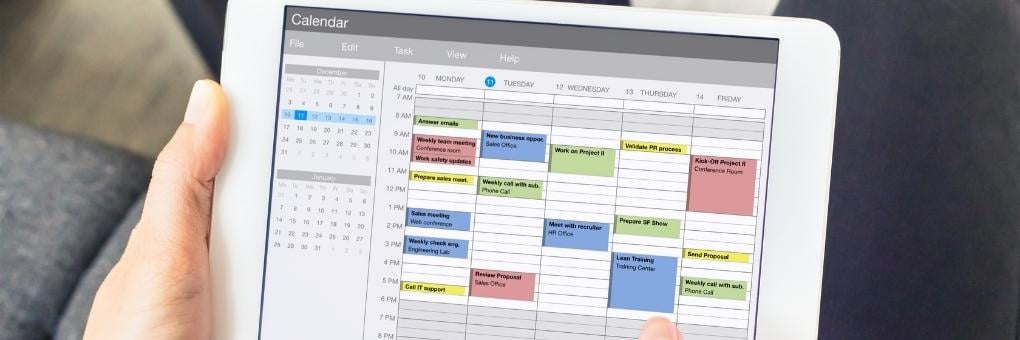Getting Things Done
Busy, busy, busy and running from one meeting to the next appears to be our new normal for our work. This constant state of running from one thing to another can leave us breathless, frazzled and truly with no time to get projects, proposals, and necessary work done. The idea of blocking time to “get work done” is hard for many of us to fathom, but it’s becoming one of the only ways we can actually make time to tackle our to-do list.
Let’s explore six areas where blocking time can help us plan ahead to get stuff done instead of staying after hours, working on the weekend or leaving it for the following week.
1. Email Overload
If your inbox is out of control, the last thing you want to do is deal with it. But if we don’t schedule uninterrupted time to organize and prioritize, things pile up pretty quick and start falling through the cracks.
2. Project Preparation
When we’re swamped and trying to keep our head above water, preparing and planning ahead seems pretty much impossible. All the more reason to set aside dedicated time to do just that. It might feel ok for you to live minute to minute, but that’s not how projects get done.
3. Presentation Creation and Fine Tuning
“Winging it” might feel like the only option sometimes, but how much more confident would you be with even 20 minutes of prep time? The delivery and reception will be worth the investment – especially if you’re running from one thing to the next every other minute, your familiarity with the content will help you relax and be yourself during your spiel.
4. Analysis of Data
How often do we collect data and not do anything with it because we just “don’t have time”? Data is an important tool that can help us analyze trends and make better decisions, but only if we use it! There are lots of other things some of us would rather do than sit and look at charts and numbers, but do those things have the same potential payoff?
5. Strategy
Much like our data analysis, it’s important to step back and look at the big picture and make sure the weeds or trees we’ve been muddling through are the right ones – and that we’re not paying too much on the way (bosses seem to care about that). When you’re stuck on the tactical treadmill trying to keep up, that step back can make you feel like you’re falling behind. Strategic check-ins are worthwhile and need to be intentional to make sure we’re spending the right time on the right things in the right direction.
6. Employee Relations
Living minute-to-minute doesn’t build morale. Dedicating time to checking in on people, and giving them your full attention, makes people feel valued and it will help you understand where others are on your team and feel more plugged into not just the work being done but the people doing the things!
I recall one week in particular before I got in the habit of blocking time to “get work done” and the entire week was booked solid, back-to-back without time for lunch or even a bio-break – this was the week when I knew I had to change my ways. I could not continue at this pace, stay productive, and, frankly, be kind, when I was literally running from meeting to meeting. No one can. I looked fatigued, replied hastily to emails and did not even have two minutes in the hallways to connect with my colleagues.
Time blocking allows us to block 30-minutes to multiple-hour time slots that can provide us time to “get work done”. We always have the choice to move the blocks or give up a time block. It is much easier to give back time than to find time in a busy calendar. As said in Entrepreneur Magazine, “time blocking can help you balance urgent and important tasks, promotes deep work, assists you in becoming more realistic with your time and more” (Rampton, 2019). Blocking time is critical if we’re going to get work done and keep a good work/life balance.
Remember those six things time blocking can help us get a better handle on? They can bog us down before we even realize the impact on our effectiveness, mindset, or true productivity.
Email overload comes up with every client I have ever partnered with – how to navigate unread emails, urgent emails, the sheer volume of emails is mind boggling and at times can paralyze us. How would blocking 30 minutes per day for email help you in being more productive? What impact would dedicated time to review, prioritize and handle unread email have on your mindset/mood?
The second most discussed area with my clients is finding time to move into strategy and out of the weeds of the day-to-day business. How much time would you like to block for strategic thinking each week? As you promote within organizations, our time is stretched even thinner, and moving into a strategic mindset matters even more. Our ability to delegate much of the tactical is imperative for our success, however finding the time for mindful thinking around strategy does not happen in 15-minute windows or during lunch. When does strategy get a dedicated time block for you?
These are two examples that affect all leaders – we cannot create more time, and our ability to use our time wisely is a make-or-break to our success, our ability to lead, and helps us show our teams a smarter approach to “getting work done” in very busy organizations.
What about you? How do you utilize or will you utilize time blocking? Join the conversation in the comments below or on social media!








